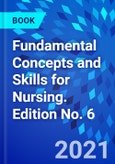Learn all the basic concepts and fundamental skills that an LPN/LVN needs! Fundamental Concepts and Skills for Nursing, 6th Edition prepares you for nursing practice in a number of care settings, including hospitals, long-term care facilities, medical offices, clinics, surgery centers, and home care agencies. Illustrated, easy-to-read guidelines ensure that you gain a thorough understanding of the nursing process and problem solving, addressing topics such as the physiologic and psychosocial needs of the patient, critical thinking and clinical judgment, communication, collaboration with the health care team, patient teaching, and cultural competence. Written by noted educator Patricia Williams, this text prepares you to pass the Next Generation NCLEX-PN� Exam and succeed in any care setting.
- Concept maps help students visualize concepts addressed in the text and show how a condition or response can affect more than one body system, relating to symptoms, treatments, and side effects.
- QSEN and Safety information highlights the knowledge, skills, and attitudes needed to continuously improve the quality and safety of patient care.
- More than 110 Skills and Steps present step-by-step procedures in an action/rationale format, including sample documentation examples and Home Care boxes, as appropriate.
- Clear, easy-to-understand readability level (11.65) makes the book accessible for LPN/LVN students, accommodating both beginning students and those speaking English as a second language.
- Get Ready for the NCLEX Examination! section at the end of each chapter reinforces learning with key points, review questions, critical thinking activities, and additional learning resources.
- Life Span Considerations: Older Adults highlight changes that occur with aging and how these affect LPNs and LVNs working with older adults in community and long-term care.
- More than 20 nursing care plans illustrate each step of the nursing process, and include critical thinking questions.
- Nursing process framework features the application of the nursing process and nursing care plans, reinforcing application of the nursing process in the clinical setting.
- Health Promotion and Patient Teaching boxes include guidelines to promote health, prevent illness, and develop self-care strategies.
- Think Critically boxes encourage students to synthesize information and apply concepts to practice.
- Communication boxes provide examples of nurse-patient dialogues and therapeutic communication techniques.
- Home Care Considerations boxes highlight the adaptation of nursing skills and techniques for the patient in the home care setting.
- Key Terms include phonetic pronunciations, which are helpful for ESL students, and text page references to find the definition.
- Numbered objectives begin each chapter, and are divided into a framework of theory and clinical practice.
- Clinical chapters give students a refresher in anatomy and physiology, with an overview of Structure and Function, and include a section on aging.
- Cultural Considerations cover biocultural variations as well as health promotion for specific ethnic groups, so students can provide culturally competent care.
- NEW! Coverage of the NCSBN Clinical Judgment Measurement Model introduces students to the testing model used on the Next Generation NCLEX� Exam.
- NEW case studies and Next Generation NCLEX Exam-style questions give students practice and prepare them for the Next Generation NCLEX Examination.
- NEW photos and illustrations show critical skills and procedures.
- NEW! Updated guidelines include those from the American Heart Association, The Joint Commission, National Pressure Ulcer Advisory Panel, Dietary Guidelines, and more.
- NEW! Expanded Evidence-Based Practice boxes and best practices are highlighted throughout the book.
Table of Contents
Unit I: Introduction to Nursing and the Health Care System1. Nursing and the Health Care System
2. Concepts of Health, Illness, Stress, and Health Promotion
3. Legal and Ethical Aspects of Nursing
Unit II: The Nursing Process
4. The Nursing Process and Critical Thinking
5. Assessment, Nursing Diagnosis/Problem Identification, and Planning
6. Implementation and Evaluation
Unit III: Communication in Nursing
7. Documentation of Nursing Care
8. Communication and the Nurse-Patient Relationship
9. Patient Education and Health Promotion
10. Delegation, Leadership, and Management
Unit IV: Developmental, Psychosocial, and Cultural Considerations
11. Growth and Development: Infancy Through Adolescence
12. Adulthood and the Family
13. Promoting Healthy Adaptation to Aging
14. Cultural and Spiritual Aspects of Patient Care
15. Loss, Grief, and End-of-Life Care
Unit V: Basic Nursing Skills
16. Infection Prevention and Control: Protective Mechanisms and Asepsis
17. Infection Prevention and Control in the Hospital and Home
18. Safely Lifting, Moving, and Positioning Patients
19. Assisting with Hygiene, Personal Care, Skin Care, and the Prevention of Pressure Injuries
20. Patient Environment and Safety
21. Measuring Vital Signs
22. Assessing Health Status
23. Admitting, Transferring, and Discharging Patients
24. Diagnostic Tests and Specimen Collection
Unit VI: Meeting Basic Physiologic Needs
25. Fluid, Electrolyte, and Acid-Base Balance
26. Concepts of Basic Nutrition and Cultural Considerations
27. Nutritional Therapy and Assisted Feeding
28. Assisting with Respiration and Oxygen Delivery
29. Promoting Urinary Elimination
30. Promoting Bowel Elimination
31. Pain, Comfort and Sleep
32. Complementary Health Approaches
Unit VII: Medication Administration
33. Pharmacology and Preparation for Drug Administration
34. Administering Oral, Topical, and Inhalant Medications
35. Administering Intradermal, Subcutaneous, and Intramuscular Injections
36. Administering Intravenous Solutions and Medications
Unit VIII: Care of the Surgical and Immobile Patient
37. Care of the Surgical Patient
38. Providing Wound Care and Treating Pressure Injuries
39. Promoting Musculoskeletal Function
Unit IX: Caring for Older Adults
40. Common Physical Care Problems of the Older Adult
41. Common Psychosocial Care Problems of the Older Adult
Appendix A: Standard Steps for All Nursing Procedures
Appendix B: NALPN Nursing Practice Standards for the Licensed Practical/Vocational Nurse
Appendix C: American Nurses Association Code of Ethics for Nurses
Appendix D: Standard Precautions
Appendix E: Most Common Laboratory Test Values
Appendix F: NANDA-I Approved Nursing Diagnoses
Reader References
Glossary








